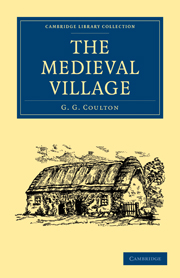Book contents
- Frontmatter
- GENERAL PREFACE
- AUTHOR'S PREFACE
- Contents
- LIST OF ILLUSTRATIONS
- ABBREVIATIONS AND AUTHORITIES
- CHAPTER I THE OPEN ROAD
- CHAPTER II VILLAGE DEVELOPMENT
- CHAPTER III A FEW CROSS-LIGHTS
- CHAPTER IV A GLASTONBURY MANOR
- CHAPTER V THE SPORTING CHANCE
- CHAPTER VI BANS AND MONOPOLIES
- CHAPTER VII THE MANOR COURT
- CHAPTER VIII LIFE ON A MONASTIC MANOR
- CHAPTER IX FATHERLY GOVERNMENT
- CHAPTER X THE LORD'S POWER
- CHAPTER XI EARLIER REVOLTS
- CHAPTER XII MONKS AND SERFS
- CHAPTER XIII THE CHANCES OF LIBERATION
- CHAPTER XIV LEGAL BARRIERS TO ENFRANCHISEMENT
- CHAPTER XV KINDLY CONCESSIONS
- CHAPTER XVI JUSTICE
- CHAPTER XVII CLEARINGS AND ENCLOSURES
- CHAPTER XVIII CHURCH ESTIMATES OF THE PEASANT
- CHAPTER XIX RELIGIOUS EDUCATION
- CHAPTER XX TITHES AND FRICTION
- CHAPTER XXI TITHES AND FRICTION (CONTINUED)
- CHAPTER XXII POVERTY UNADORNED
- CHAPTER XXIII LABOUR AND CONSIDERATION
- CHAPTER XXIV THE REBELLION OF THE POOR
- CHAPTER XXV THE REBELLION OF THE POOR (CONTINUED)
- CHAPTER XXVI THE DISSOLUTION OF THE MONASTERIES
- CHAPTER XXVII CONCLUSION
- APPENDIXES
- POSTSCRIPTS
- INDEX
- Plate section
CHAPTER XXV - THE REBELLION OF THE POOR (CONTINUED)
Published online by Cambridge University Press: 06 December 2010
- Frontmatter
- GENERAL PREFACE
- AUTHOR'S PREFACE
- Contents
- LIST OF ILLUSTRATIONS
- ABBREVIATIONS AND AUTHORITIES
- CHAPTER I THE OPEN ROAD
- CHAPTER II VILLAGE DEVELOPMENT
- CHAPTER III A FEW CROSS-LIGHTS
- CHAPTER IV A GLASTONBURY MANOR
- CHAPTER V THE SPORTING CHANCE
- CHAPTER VI BANS AND MONOPOLIES
- CHAPTER VII THE MANOR COURT
- CHAPTER VIII LIFE ON A MONASTIC MANOR
- CHAPTER IX FATHERLY GOVERNMENT
- CHAPTER X THE LORD'S POWER
- CHAPTER XI EARLIER REVOLTS
- CHAPTER XII MONKS AND SERFS
- CHAPTER XIII THE CHANCES OF LIBERATION
- CHAPTER XIV LEGAL BARRIERS TO ENFRANCHISEMENT
- CHAPTER XV KINDLY CONCESSIONS
- CHAPTER XVI JUSTICE
- CHAPTER XVII CLEARINGS AND ENCLOSURES
- CHAPTER XVIII CHURCH ESTIMATES OF THE PEASANT
- CHAPTER XIX RELIGIOUS EDUCATION
- CHAPTER XX TITHES AND FRICTION
- CHAPTER XXI TITHES AND FRICTION (CONTINUED)
- CHAPTER XXII POVERTY UNADORNED
- CHAPTER XXIII LABOUR AND CONSIDERATION
- CHAPTER XXIV THE REBELLION OF THE POOR
- CHAPTER XXV THE REBELLION OF THE POOR (CONTINUED)
- CHAPTER XXVI THE DISSOLUTION OF THE MONASTERIES
- CHAPTER XXVII CONCLUSION
- APPENDIXES
- POSTSCRIPTS
- INDEX
- Plate section
Summary
The uprising, then, was natural and almost inevitable; no less naturally or inevitably, again, the rebels struck at the Church landlord as at the squire. Many parsons were too rich, many others too poor, to allow the parishioners what everybody knew to be, in theory, their share of the parish revenues. So, again, with the monasteries. Peter of Blois had expressed the feelings of the best churchmen of the twelfth century when he wrote: “It is detestable in a monk that, under any custom of colour, or honour, or title of power, he should possess feudal rights and bondmen and bondwomen, or homages and fealties and allegiances, or that he should lay forced labour upon them, and extra-services and other burdens of public works,” and that, on the strength of these revenues, he should lead an easy life. Luchaire shows how, in that same century, when monasticism was at its strongest, the monk suffered almost more than any other from any outbreak of lawlessness, since his wealth was always a temptation to the spoiler, and here, for the moment, was a spoiler restrained by no religious considerations. Great and well-ordered abbeys, it is true, were centres of charity to the country round; but even here their influence is very commonly exaggerated by modern authors, as I hope to show in the second volume of my Five Centuries of Religion.
- Type
- Chapter
- Information
- The Medieval Village , pp. 357 - 367Publisher: Cambridge University PressPrint publication year: 2010First published in: 1925



